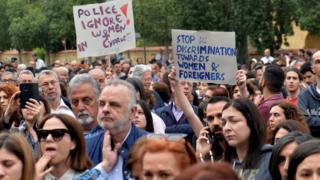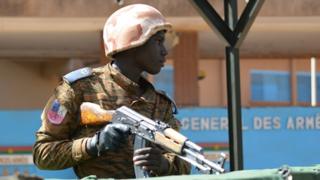 Image copyright
Image copyright
Reuters
Demonstrators attended a vigil in memory of the victims of the serial killer
Cyprus has been left stunned after a man confessed to killing seven women and girls, all of foreign descent, in what is thought to be the island’s first serial killing.
The authorities are facing accusations of not fully investigating when the women were first reported missing.
So far, the bodies of three Filipino women have been found and two lakes are being combed for further victims.
The suspect, a 35-year-old Greek-Cypriot army officer, is in custody.
Crime rates are low in Cyprus and violence against women on this scale has not been seen outside of wartime. It has a population of about 890,000.
The Mediterranean island is split between a northern part run by a Turkish Cypriot government and the internationally recognised government in the south run by Greek Cypriots. The search is focused southwest of the capital of Nicosia.
In a statement, President Nicos Anastasiades said he was “shocked by the revelation of so many shameful murders against innocent foreign women and young children”.
News website Kathimerini Cyprus issued a letter of apology to the victims’ families and said it was a “crime against the country, carried out by an assassin” but “perpetrated by a state and society constantly developing xenophobic tendencies and racist behaviours”.
How did it all unfold?
Earlier this month, the bodies of two women, Marry Rose Tiburcio, 38, and Arian Palanas Lozano, 28, both from the Philippines, were discovered. They had been reported missing last year.
After tracking Ms Tiburcio’s online messages, an army officer was arrested on suspicion of murder.
Image copyright
EPA
Fire-fighters and investigators are searching the Red Lake in Mitsero using robotic equipment to navigate its toxic water
He at first denied killing a third Filipino woman, Maricar Valtez Arquiola, 31, who has been missing since late 2017, but then changed his testimony and confessed to the murder of seven women and girls over the past three years.
Following the arrest, the suspected murderer showed investigators to a well at an army firing range where the unidentified body of a woman of Nepalese or Indian descent was discovered.
Authorities are now scouring two lakes in the south for the bodies of a Romanian mother and her young daughter.
A search is also underway for Ms Tiburcio’ six-year-old daughter, who the suspect has also confessed to killing.
What do protesters say?
The authorities have been accused of not taking the cases seriously due to the women being of foreign descent.
The main opposition party, AKEL, called on the police chief and justice minister to resign.
“Unprecedented indifference was shown simply because these people were not of Cypriot origin but came from foreign countries,” said AKEL leader Andros Kyprianou.
Doros Polycarpou, the director of Kisa, a migrant and refugee support group, told Reuters that Cyprus operated a “two-tier system” in which “some non-Cypriots did not enjoy the same rights as locals”.
Image copyright
EPA
Migrant workers in Cyprus stand in solidarity, holding a banner that reads “Where are you?”
“We had repeatedly said that migrants and refugees to our country are particularly vulnerable,” she said.
Cypriot police have said they will investigate the handling of the case.
Maria Mappouridou, a Cypriot chemical engineer, set up a Facebook event for the vigil in response to the killings. She said 1500 attended.
The organiser said the women’s deaths have “come as a shock” and brought the plight of migrant women into the public consciousness.
“I’m afraid to say we didn’t notice these women who lived here and work for us and came here for a better life,” she said.
“We haven’t heard anything about them, but the question is have we asked?”
Image copyright
Reuters
Two women hug at the public vigil in memory of the serial killer’s victims
“They have always been dismissed as lower rank because of the jobs they commonly have,” one protester said, pointing out that neither the government nor the church had organised any days of mourning dedicated to the victims.
Christina Skarpari said she was at the protest because she was angry about being governed by a system which failed to protect women and society as a whole.
“The lack of justice, coupled with the lack of accountability and insufficient answers of the government for these persons’ deaths, make people in my community feel exasperated,” she said.
“The lack of systemic approach when it comes to local investigations, women’s rights, profound racism, sexism and lack of social justice as a whole, is representative of a greater loophole in Cyprus and a corrupt mentality which is very much part of the norm,” Ms Skarpari added.












